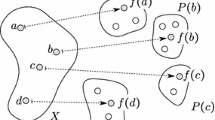Abstract
New light is shed on Leibniz’s commitment to the metaphysical priority of the intensional interpretation of logic by considering the arithmetical and graphical representations of syllogistic inference that Leibniz studied. Crucial to understanding this connection is the idea that concepts can be intensionally represented in terms of properties of geometric extension, though significantly not the simple geometric property of part-whole inclusion. I go on to provide an explanation for how Leibniz could maintain the metaphysical priority of the intensional interpretation while holding that logically the intensional and the extensional stand in strictly inverse relation to each other.
Similar content being viewed by others
REFERENCES
Burkhardt, H.: 1980, Logik und Semiotik in der Philosophie von Leibniz, Philosophia Verlag, Munich.
Couturat, L.: 1961, La Logique de Leibniz, d'après des documents inédits, Olms Verlag, Hildesheim.
Heinekamp, A. and Schupp, F.: 1979, Die intensionale Logik bei Leibniz und in der Gegenwart, Wiesbaden.
Kauppi, R.: 1960, Über die Leibnizsche Logik, mit besonderer berücksichtigung des promlems der intension und der extension, in Acta Philosophica Fennica, fasc. XII, Societas Philosophica, Helsinki.
Ketner, K. L.: 1987, 'Identifying Peirce's “Most Lucid and Interesting Paper”', Transactions of the Charles S. Peirce Society 23, 539–555.
Leibniz, G. W.: 1961a, Die Philosophische Schriften von Gottfried Wilhelm Leibniz, ed. C. J. Gerhardt, Olms Verlag, Hildesheim.
Leibniz, G. W.: 1961b, Opuscules et Fragment Inédits, ed. Louis Couturat, Olms Verlag, Hildesheim.
Leibniz, G. W.: 1962, Sämtliche Schriften und Briefe, Reihe VI, Band VI, Akademie Verlag, Berlin.
Leibniz, G. W.: 1966, Logical Papers, trans. and ed. G. H. R. Parkinson, Clarendon Press, Oxford.
Leibniz, G. W.: 1969, Philosophical Papers and Letters, trans. and ed. Leroy E. Loemker, D. Reidel, Boston.
G. W.: 1971, Mathematische Schriften, ed. C. J. Gerhardt, Olms Verlag, Hildesheim.
Leibniz, G. W.: 1981, New Essays on Human Understanding, trans. and ed., Peter Remnant and Jonathan Bennett, Cambridge University Press, Cambridge.
Lenzen, W.: 1983, 'Zur extensionalen und “intensionalen” Interpretation der Leibnizschen Logik', Studia Leibnitiana, 15, 129–148.
Lenzen, W.: 1990, Das System der Leibniz'schen Logik, de Gruyter, Berlin.
Lukasiewicz, J.: 1957, Aristotle's Syllogistic, from the standpoint of modern formal logic, second edition, enlarged, Clarendon Press, Oxford.
O'Briant, W.: 1967, 'Leibniz's Preference for an Intensional Logic (A Reply to Mr. Parkinson)', Notre Dame Journal of Symbolic Logic 8, 254–6.
Peirce, C. S.: 1992, Reasoning and the Logic of Things, Harvard University Press, Cambridge.
Roberts, D.: 1973, The Existential Graphs of Charles S. Peirce, Mouton, The Hague.
Sleigh, R.: 1982, 'Truth and Sufficient Reason in the Philosophy of Leibniz', in Hooker, M., Leibniz: Critical and Interpretive Essays, University of Minnesota Press, Minneapolis.
Author information
Authors and Affiliations
Rights and permissions
About this article
Cite this article
Bassler, O.B. Leibniz on Intension, Extension, and the Representation of Syllogistic Inference. Synthese 116, 117–139 (1998). https://doi.org/10.1023/A:1005076530958
Issue Date:
DOI: https://doi.org/10.1023/A:1005076530958




